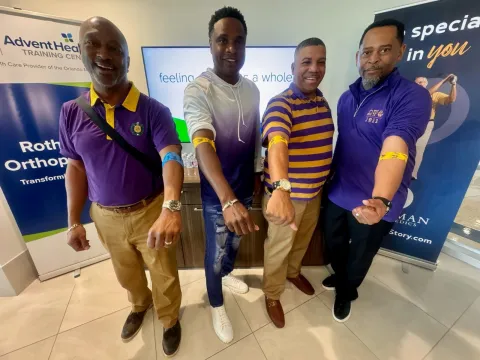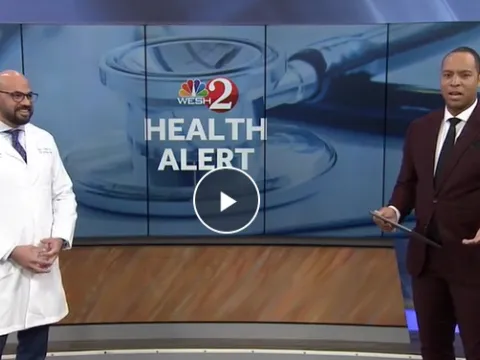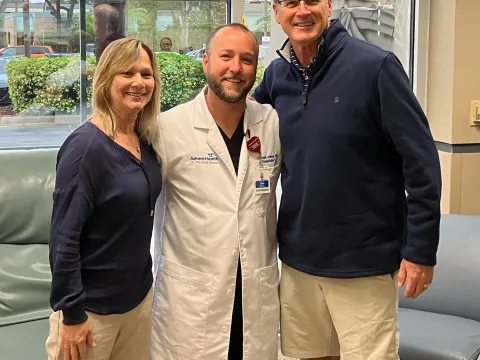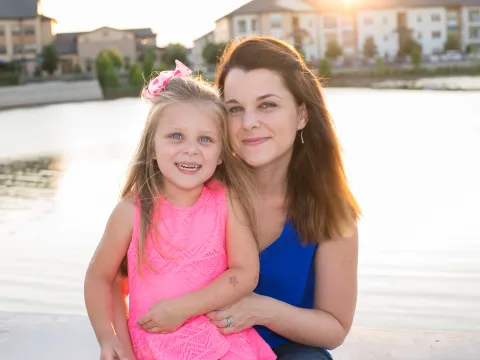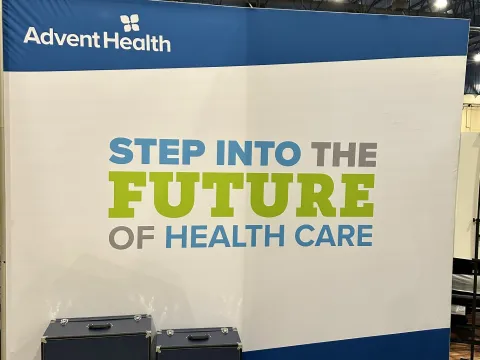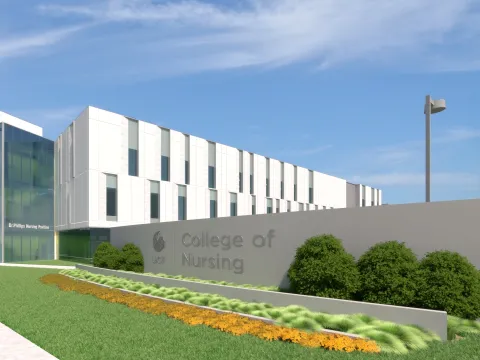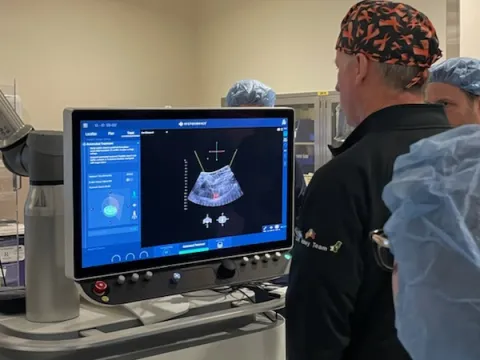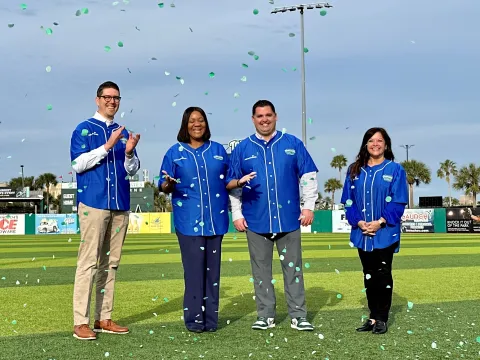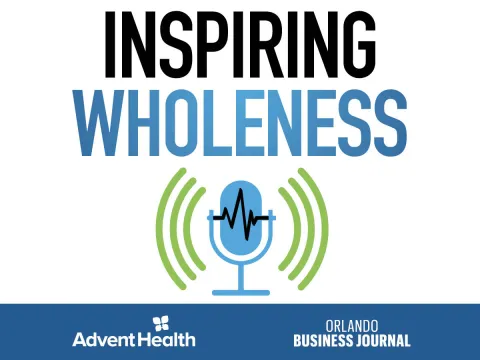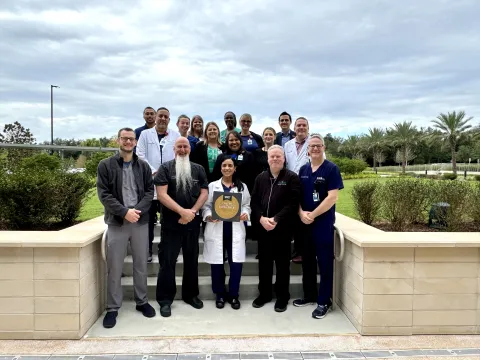- Jose Luis Dieppa
Choose the health content that’s right for you, and get it delivered right in your inbox.
ORLANDO, Fla. – At just 35 years old, Carlos Paredes got a stunning diagnosis: he had Parkinson’s disease.
“I did not want to believe that I had Parkinson’s at my age,” he said. “At that time, I was about to get married, and I was ready to start a family. So, it was hard for me.”
Paredes initially noticed tremors in one of his fingers. Over the years the uncontrollable movements spread to all his fingers, and eventually to both arms. The tremors were so severe that he struggled with simple tasks such as drinking from a cup, writing and brushing his teeth.
“My movements increased to the point I could not hold a plate for dinner, I could not play with my daughter, or shave,” he said.
His family advised him to see a neurologist, who diagnosed him with Parkinson’s disease – a progressive condition that causes tremors, slowness and balance issues. After years of taking up to 16 pills daily without much improvement, his mother suggested he see an expert in brain surgery.
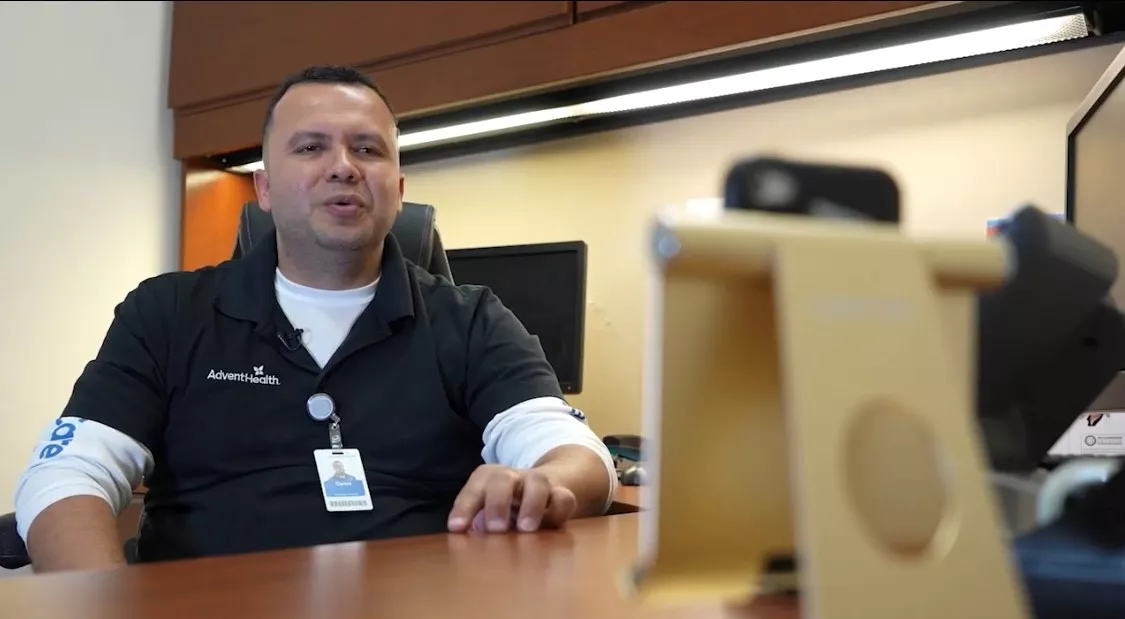
In consultation with his medical team, which included neurosurgeon Dr. Chandan Reddy at AdventHealth Celebration and Dr. Mitesh Lotia, movement disorder neurologist and medical director of the movement disorder program at AdventHealth, it was determined that Carlos was an ideal candidate for deep brain stimulation surgery.
“Deep brain stimulation is a procedure where we insert two small wires into either side of the brain. They stimulate a very specific area of the brain to help treat tremors and other symptoms of Parkinson’s disease,” said Dr. Lotia.
By implanting electrodes, doctors can stimulate the specific areas of the brain associated with the unique condition of the patient through electrical impulses that regulate signals, cells and chemicals. A pacemaker-like device is implanted under the skin of the patient’s chest that controls the amount of stimulation the patient receives, and a wire connects the device to the electrodes in the brain. After surgery, visits are frequent in the first several months for therapy management, and require in-person visits to ensure the device is working properly and to modify settings when needed.
But thanks to innovative new technology, the adjustments can now be done remotely through the NeuroSphere Virtual Clinic. The process is simple: using a tablet, Dr. Lotia can observe Paredes’ symptoms and change the stimulation in his brain during a telehealth visit, which can be done from anywhere, such as the patient’s home or workplace. The results can be seen immediately.
“Doing this virtually pretty much serves the same purpose of doing it in clinic,” said Dr. Lotia. “We can provide the same and effective care in the comfort of their home or as in Carlos’ case, their work.”
Deep brain stimulation surgery can improve the quality of life of the patient, including returning to hobbies, sports, and other activities. It can also help the patient manage their symptoms as the disease changes or progresses.
For Paredes, the procedure permitted him to return to the things he loves including his job.
“My life has improved 90% because I do not have the movements anymore. I can play with my daughter, I can do my job normally, I can have a life with my family,” he said.
According to Dr. Lotia, about 15% of patients with Parkinson’s disease in the United States become good candidates for deep brain stimulation surgery. However, it is still very underutilized service due to many factors such as lack of awareness, delayed referrals and fear of brain surgery.
“I was very scared of the procedure, but I did it for family,” Paredes said. “I hope that people who may have the same condition see my story and get the help they need. If I can help one person, it was all worth it.”
Paredes’ story appeared on “AdventHealth TV,” AdventHealth’s internal newscast for Central Florida Division team members. Watch here: Deep Brain Stimulation - AdventHealth TV Story
Recent News
One in six Black men will develop prostate cancer in their lifetime, according to ZERO Prostate Cancer.
Doctors at the AdventHealth Digestive Health and Surgery Institute are trying to better understand why men under 50 are seeing higher colorectal cancer mortality rates and say there are certain risk...
AdventHealth hospitalist Dr. Joe Jones revives a patient experiencing a sudden heart attack.
A genetic test, originally conducted to help better understand her daughter's diagnosis, revealed Samantha Arceneaux carries a genetic variant that virtually guarantees she will develop an aggressive...
AdventHealth and Junior Achievement of Central Florida proudly announce a partnership to unite efforts to inspire Central Florida students to pursue a career in the health care industry. Together, the...
AdventHealth joined the University of Central Florida and several community partners last week to celebrate the groundbreaking of the Dr. Phillips Nursing Pavilion. This state-of-the-art building will...
Kidney-tumor patients have an innovative new treatment option, first performed recently by a surgical team at AdventHealth Celebration.
The two organizations, local officials, and student athletes celebrated the groundbreaking partnership at the iconic Jackie Robinson Ballpark.
The new SMILE with Stella Tremonti Down Syndrome Clinic is the only lifespan program of its kind in the Southeast.
Chuck File knew something was horribly wrong, as he walked into his gym to workout in October of 2023.
The accreditation recognizes the hospital’s commitment to excellence in patient care and safety.
As the world rang in 2024, AdventHealth for Women welcomed the very first babies of the new year. Meet Jose, Huxli, Michael, Isaiah and Harlynn!


